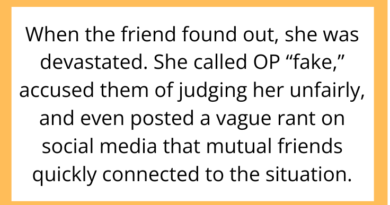AITAH for Wanting My Partner to Stop Venting About Work Every Night?
I came across an intriguing scenario in the r/AITAH subreddit that struck a chord with thousands of readers: Am I the problem for asking my partner to stop unloading work complaints on me every single evening?
This question opens up a bigger conversation about emotional labor, boundaries in relationships, and how much support is too much.
The Situation: When Venting Becomes Overwhelming

A Reddit user shared that their partner comes home every night and spends hours complaining about their toxic job, rude coworkers, and constant stress.
At first, OP (original poster) tried to be empathetic. They listened, offered advice, and validated their partner’s feelings. But over time, the daily negativity began taking a toll.
OP found themselves feeling drained, anxious, and unable to relax in their own home. Finally, they asked their partner to limit the venting or consider speaking with a therapist instead.
The partner accused OP of being unsupportive and selfish, sparking a debate in the comments about whether setting this boundary was fair.
The Hidden Cost of Emotional Labor

Being a Partner vs. Being a Therapist
One of the biggest themes in this scenario is emotional labor — the invisible work of managing someone else’s feelings.
While it’s normal to lean on a partner in stressful times, a pattern of chronic venting can cross a line. When every conversation becomes a dumping ground for frustrations, it leaves little room for joy, connection, or balance.
Example:
One commenter shared how their spouse’s daily rants about work left them feeling like they were always on-call as an unpaid therapist. Eventually, it led to resentment and emotional burnout.
Setting Boundaries Without Feeling Guilty

Why Boundaries Are Healthy, Not Hurtful
Boundaries are often misunderstood as rejection. But in reality, they’re essential for maintaining a healthy relationship.
By asking their partner to limit venting or seek professional help, OP wasn’t abandoning them. They were simply acknowledging their own limits.
A relationship should be a partnership, not a one-sided emotional support system. Without boundaries, even the strongest bond can crumble under the weight of constant negativity.
Therapists Exist for a Reason
One point that many commenters made was that therapists are trained to help people process chronic stress.
While partners can be supportive, they can’t always offer the tools, objectivity, and coping strategies that therapy provides.
Encouraging a loved one to seek counseling isn’t dismissive — it’s often the most compassionate thing you can do when you realize you’re not equipped to carry it all alone.
Communication Is Key

How to Express Your Needs Without Escalating Conflict
OP’s situation highlights the importance of clear, respectful communication.
When setting boundaries, try these steps:
-
Use “I” statements. For example: I feel overwhelmed when we only talk about work stress every night.
-
Acknowledge their feelings. Validate that their job is hard and that you care.
-
Offer alternatives. Suggest scheduling a specific time to talk about work or exploring therapy.
-
Reaffirm your commitment. Make it clear you still love and support them.
Done thoughtfully, this approach can reduce defensiveness and create space for understanding.
The Verdict – AITAH or Not?

Based on thousands of upvotes and supportive comments, the consensus was clear: OP is not the problem.
It’s reasonable to expect that your home life includes connection, laughter, and downtime — not just an endless stream of complaints.
Setting limits doesn’t mean you don’t care. It means you value both your well-being and the health of your relationship.
Takeaways for Anyone Facing Similar Struggles

If you’re in a relationship where venting has become overwhelming, remember:
-
You are allowed to have limits.
-
It’s okay to suggest professional help.
-
Boundaries protect both people, not just one.
-
Healthy relationships require mutual care and respect.



